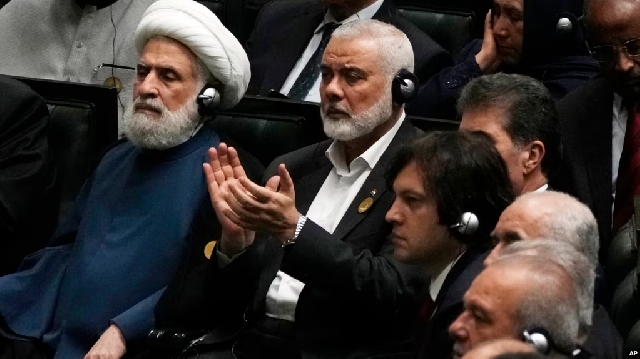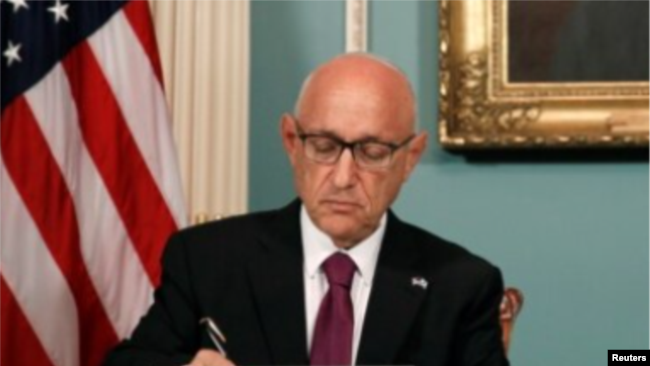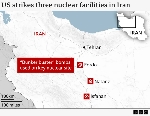Hamas, Hezbollah face dilemmas in hitting back at Israel after assassinations of key leaders
 July 30, 2024: Hamas chief Ismail Haniyeh (claps) and deputy leader of Lebanon’s Hezbollah, Sheikh Naim Kassem (left) during the swearing-in ceremony of Iranian President Masoud Pezeshkian in parliament, in Tehran (Iran)
July 30, 2024: Hamas chief Ismail Haniyeh (claps) and deputy leader of Lebanon’s Hezbollah, Sheikh Naim Kassem (left) during the swearing-in ceremony of Iranian President Masoud Pezeshkian in parliament, in Tehran (Iran)
A former Israeli national security adviser tells VOA that Iranian proxy groups Hamas and Hezbollah face dilemmas in considering retaliations against Israel for the assassinations of two of their senior members in strikes on Beirut and Tehran over several hours beginning Tuesday.
Israeli reserves Brig. Gen. Jacob Nagel, a former national security adviser to Prime Minister Benjamin Netanyahu, discussed those dilemmas in a Wednesday phone interview with VOA. Nagel is an Israel-based senior fellow at the Foundation for Defense of Democracies, a U.S. foreign policy and security research group in Washington.
Israel asserted that it killed Fuad Shukr, the top military commander of Lebanon’s U.S.-designated terror group Hezbollah, in a Tuesday strike on a building in the group’s stronghold of southern Beirut. Hezbollah has not said whether Shukr was killed in the attack.
 | Jacob Nagel is shown at the State Department in Washington, Sept. 14, 2016
| Jacob Nagel is shown at the State Department in Washington, Sept. 14, 2016
The Israeli government and military have not commented on the attack that Iran and the Hamas terror group said killed the group’s political chief Ismail Haniyeh in Tehran hours later. Hamas and Iranian state media blamed Israel for Wednesday’s pre-drawn strike on a residence in the Iranian capital, without citing evidence.
The following transcript of Nagel’s interview has been edited for brevity and clarity.
VOA: What is your reaction to the killing of Hamas political chief Haniyeh in Tehran?
Jacob Nagel, Foundation for Defense of Democracies: There were three Hamas political chiefs responsible for the Oct. 7 terror attack on Israel: Haniyeh, Khaled Mashaal and Saleh al-Arouri (whom Hamas accused Israel of killing in an earlier strike on southern Beirut on January 2). Two have been taken out. There is one more to go.
VOA: How do you think Iran will respond?
Nagel: Iran will retaliate. They usually do so by using Hamas or Hezbollah.
Hamas would like to retaliate. They do not have so many capabilities left (after nine months of fighting Israel). If they want to fire missiles at Tel Aviv, they can.
Hezbollah is totally different. They have a lot of capabilities. They have to decide if they are going to take their (nine-month, low-level) conflict with Israel to the next level of retaliation. Do they want a full-scale war or not? If they will retaliate the way that I think they will, Israel will have to retaliate against them in kind. There are enough targets in Lebanon that we can attack. And we will see who is the last one to retaliate. It is not so important to be the last one, but what are the results.
VOA: What steps do you expect Israeli authorities to take in case there is a retaliation?
Nagel: Israel’s Home Front command is not changing anything in terms of preparedness. If we have a specific precaution that we need to take, we will take it. Right now, Israelis have to listen for any instructions and if there is a siren, go to a shelter. We are taking care of the security of Israel from the north to the south and from any other place.
Source: voanews.com/Michael Lipin
Trending World

'Unprecedented' alerts in France as blistering heat grips Europe
17:26
One of Nigeria’s richest men set to be buried in Saudi Arabia
13:53
Queen of Katwe's gambit still in play for Uganda's slum chess players
13:42
Dozens of Ghanaians trafficked in football job scam rescued in Nigeria
19:14
Thai prime minister suspended over leaked phone call
19:14
Liberian president killed in coup gets state funeral after 45 years
19:15
India sends its first astronaut into space in 41 years
14:17
US gained nothing from strikes, Iran's supreme leader says
01:38
Trump calls for end to Netanyahu corruption trial
01:31
US Supreme Court allows parents to opt out of lessons with LGBT books
19:03




